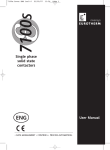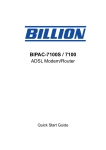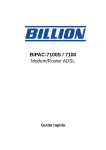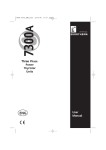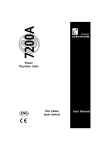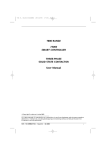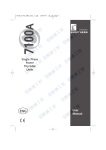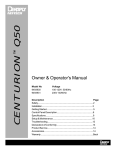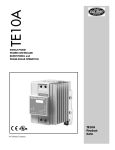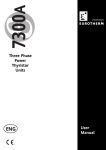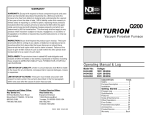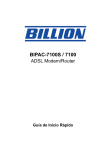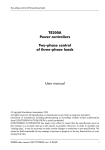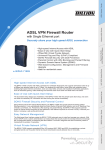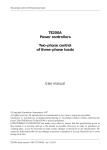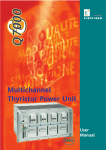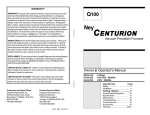Download 7100s.Cover iss2.0
Transcript
7100S Single phase solid state contactors ENG • DATA MANAGEMENT • CONTROLS • PROCESS AUTOMATION• User Manual 7100S SMART CONTROLLERS SINGLE-PHASE INDUSTRIAL SOLID STATE CONTACTORS 7000 series User Manual © Copyright Eurotherm Limited 2003 All rights reserved. All reproduction or transmission in any form whatsoever and using any procedure (electronic or mechanical, including photocopying and recording) without written permission from Eurotherm is strictly prohibited. Ref.: HA176386ENG - Issue 2.0 - 09/2003 i ii 7100S User Manual Contents CONTENTS Page European directives and applicable standards . . . . . . . . . . .iv Commissioning flowchart . . . . . . . . . . . . . . . . . . . . . . . . . . . .vi Chapter 1 Solid state contactor identification . . . . . . . . .1-1 Chapter 2 Installation . . . . . . . . . . . . . . . . . . . . . . . . . . . . .2-1 Chapter 3 Operation (Firing, Alarms) . . . . . . . . . . . . . . .3-1 Chapter 4 Commissioning and Maintenance . . . . . . . . .4-1 Index . . . . . . . . . . . . . . . . . . . . . . . . . . . . . . . . . . . . . . . . . . . . .5.1 Eurotherm business group addresses . . . . . . . . . . . . . . . . .6-1 PURPOSE OF MANUAL This manual (Issue 2.0) describes the Basic Version and all options for 7100S series solid state contactors with current ratings of up to 250 A. General information about the digital communication option is presented in the technical specifications (section 1). The operation of 7100S units with this option and the operation of the digital communication are described in the ‘7000 Series. Digital Communication’ manual (part number HA176664ENG available later). 7100S User Manual iii Applicable standards EUROPEAN DIRECTIVES AND APPLICABLE STANDARDS COMPLIANCE WITH PRODUCT STANDARD 7100S products comply with the terms of product standard EN 60947-4-3 ‘Contactors and motor-starters - AC semiconductor controllers and contactors for nonmotor loads’. The number of this standard is indicated on the front panel label. CE LABELLING 7100S products, installed and used in accordance with their user manual, bear CE labelling to indicate compliance with the essential requirements of: • the European Low Voltage Directive 73/23 EEC dated 19 February 1973 amended by 93/68 EEC dated 22 July 1993 • the Electromagnetic Compatibility Directive 89/336/EEC dated 3 March 1969 amended by 92/31/EEC dated 28 April 1992 and 93/68/EEC dated 22 July 1993. SAFETY The units have IP20 protection rating as defined by standard IEC 60529. External wiring must comply with standards IEC 60364-4-43 and IEC 60943. Copper cables and conductors rated to a temperature of 75°C (167°F) must be used. ELECTROMAGNETIC COMPATIBILITY (EMC) TEST STANDARDS 7100S products installed and used in accordance with the user manual, are designed for an industrial environment and must not be used in the home. IMMUNITY The EMC immunity test standards required by product standard EN 60947-4-3 are given in table 1. Test type Minimum levels EMC test standard Electrostatic discharge 4 kV on contact; 8 kV in air EN 61000-4-2 Radiated, radio frequency electromagnetic field 10 V/m 80 MHz ≤ f ≤ 1 GHz; 80% modulation 1 kHz sinusoidal EN 61000-4-3 Electrical fast transient / burst 2 kV / 5 kHz EN 61000-4-4 Electrical surge 4 kV line to earth; 2 kV line to line EN 61000-4-5 Conducted disturbances 140 dBµV; 150 kHz ≤ f ≤ 80 MHz EN 61000-4-6 Voltage dips, short interruptions and voltage variation 5 s interruptions EN 61000-4-11 Table 1 EMC immunity standards compliance iv 7100S User Manual Applicable standards EMISSIONS The EMC emissions test standards required by product standard EN 60947-4-3 are given in table 2. Emission type Firing mode EMC test standard Radiated, radio frequency All firing modes CISPR 11 Class A Conducted, radio frequency ‘Burst mode’ and ‘Single-cycle’ CISPR 11 Class A Group 2 ‘Phase angle’ (Product compliant if external series filter fitted) Table 2 EMC emissions standards compliance EMC FILTER (conducted emissions) For facilities required to comply with the levels stipulated under the generic standard for conducted emissions, EN 61000-6-4, Eurotherm Automation can provide optional internal filters (code FILT) on units up to 100 A. EMC GUIDE To help you deal with installation-dependent electromagnetic interference effects, Eurotherm provides an ‘Electromagnetic compatibility’ installation guide (ref. HA025464) which sets out best current practice regarding EMC. DECLARATION OF CONFORMITY A CE declaration of conformity is available on request. 7100S User Manual v Quick commissioning COMMISSIONING FLOWCHART Check characteristics of unit and installation Product code and specifications correspond Pages 1-7 to 1-13 Power wiring Supply protection, protective earth (PE terminal) Pages 2-8, 2-9, 4-3 Power terminals Supply: 1/L1, 3/L2 (1/L1 for ≥ 250A) Pages 2-7 to 2-9, 4-3 Fan: FAN terminal block (rating ≥ 250 A ) Pages 2-9, 4-3 24 Vdc or 24 Vac (for RTR or MOP option) : Aux2 terminal block Page 2-12 Input signal wiring DC logic signal: LDC terminal block AC logic signal: HAC terminal block 4-20 mA analogue signal: ATP terminal block Digital signal (MOP option) : COM terminal block Page 2-10 Power up Check supply presence Green ON LED Apply input signal Check firing Green HEAT LED and load current present Pages 2-10, 3-4 Set DLF alarm: option (if conditions met) CHK/SET push button Pages 3-9, 3-10, 4-3 Normal operation ON and HEAT LEDs Alarmes signalées Alarms signalled GRF, DLF, T° LEDs Pages 3-5 to 3-7 Maintenance Pages 4-2, 4-3 Load: 2/T1, 4/T2 (2/T1 for ≤ 250A) Auxiliary supply vi 7100S User Manual Identification Chapter 1 SOLID STATE CONTACTOR IDENTIFICATION Contents Page General presentation . . . . . . . . . . . . . . . . . . . . . . . . . . . . . . . . . . . . . . .1-2 Basic version . . . . . . . . . . . . . . . . . . . . . . . . . . . . . . . . . . . . . . . . .1-2 Versions with options . . . . . . . . . . . . . . . . . . . . . . . . . . . . . . . . . .1-3 Technical specifications . . . . . . . . . . . . . . . . . . . . . . . . . . . . . . . . . . . . .1-7 Coding . . . . . . . . . . . . . . . . . . . . . . . . . . . . . . . . . . . . . . . . . . . . . . . . . . .1-12 Example code . . . . . . . . . . . . . . . . . . . . . . . . . . . . . . . . . . . . . . . . .1-14 Identification label . . . . . . . . . . . . . . . . . . . . . . . . . . . . . . . . . . . . .1-14 7100S User Manual 1-1 Identification Chapter 1 IDENTIFICATION GENERAL PRESENTATION 7100S series solid state contactors are used to control the electrical power of single phase industrial loads. The load controlled may comprise low temperature coefficient resistive loads or short wave infrared (SWIR) elements. Current ratings vary from 16 A to 630 A (see coding), at voltages of 100 V to 690 V. 7100S series power thyristor units (rating of up to 100 A) comprise two channels, one controlled by thyristors and one direct internal channel. 7100S units rated 125 A and above only comprise a single controlled channel. BASIC VERSION (without options) Power terminals (supply side) ε Protective earth terminal EUROTHERM 7100 S 16 A / 230 V User label 1/L1 3/L2 2/T2 4/T2 PE Nominal current (rating) and nominal voltage Internal wiring diagram Thyristor firing request (logic) Input logic signal terminal labelling Input logic signal terminal block ON HEAT EN 60947-4-3 LDC Supply present 0VL LD 11 12 Product standard Power terminals (load side) Figure 1-1 General view of 7100S, Basic version (here with DC logic input, 16 A rating) 1-2 7100S User Manual Identification VERSIONS WITH OPTIONS The figures below show general views of 7100S units (100 and 250 A versions) with Alarms, Retransmission or Communication options and with various input types. The diagrams indicate the power and command terminals, terminal block labels, indicators and settings push button. Options (alarms) Figure 1-2 shows a general view of the 7100S with GRF (serious alarms) and DLF (Diagnostic Load Failure alarm) options. Power terminals (supply side) User label Rating (nominal current) and nominal voltage ε EURO THER M Internal wiring diagram Serious alarms 7100 S 100 A / 500 V 1/L1 3/L2 2/T1 4/T2 Partial load failure alarm Protective earth terminal PE Alarm options DLF option CHK/SET push button: DLF alarm setting / diagnosis GRF DLF CHK SET ON HEAT EN 60947-4-3 ALR Supply present 1a 1b 73 74 Firing request (logic) LDC Product standard 0VL LD 11 12 Alarms option: Alarm relay contact terminal labelling Input logic signal labelling Power terminals (load side) Input logic signal terminal block GRF or DLF option: Alarm relay contact terminal block Figure 1-2 General view of 7100S with DLF option (here with 100 A rating and DC logic input) 7100S User Manual 1-3 Identification Figure 1-3 shows a general view of a fan-cooled 7100S unit with alarms. Protective earth terminal Controlled phase terminal (supply side) 1/L1 Not used Internal fuse compartment 2 attachment screws for internal fuse compartment Internal wiring diagram (internal fuse for 125 to 250 A ratings) 710 0 S ε EUR OTH ERM Over-temperature alarm (250 A only) 250 A / 500 V PE 1/L1 DLF option: CHK/SET push button: DLF alarm setting / diagnosis 2/T1 T° Signalling LEDs (alarms and operation) GRF CHK SET DLF ON EN 60947-4-3 0VL LD 230 N 16 17 18 Fuse blown contact (code MSFU) 1a 1b 73 74 L2 21 22 MSF 11 12 FAN LDC Control terminal labelling EXT ALR HEAT 3a 3b 75 76 Control terminal block Fan power supply (250 A only) 2/T1 Controlled phase terminal (load side) Not used Fan Figure 1-3 General view of 7100S, 250 A rating (here with DLF, DC logic input, 230V fan power supply) 1-4 7100S User Manual Identification Version with Analogue Retransmission Option The Retransmission option (only available with the DLF option) provides an analogue signal which follows the rms load current. Figure 1-4 shows a general view of a 7100S unit with DLF and Retransmission options (here with analogue ATP input signal and Burst mode firing). Power terminals (supply side) Rating (nominal current) and nominal voltage ε EURO THER M User labelling Internal wiring diagram Serious alarms 7100 S 100 A / 500 V 1/L1 3/L2 2/T1 4/T2 Partial load failure alarm Protective earth terminal PE DLF option: CHK/SET push button: DLF alarm setting / diagnosis GRF DLF CHK SET ON Supply present Retransmission power supply terminal labelling HEAT AT P 0V1 DC1 41 42 Aux RT R Firing request (burst mode) 2 ALR EN 60947-4-3 1a 1b 73 74 24V 0VS 19 20 0VA RI 11 12 Analogue input signal terminal labelling Power terminals (load side) Analogue input signal terminal block Alarm relay contact terminal block Figure 1-4 General view of 7100S with Retransmission option (here with 100 A rating, analogue input) 7100S User Manual 1-5 Identification Version with digital communication option Digital communication (RS485 bus) provides 7100S solid state contactors with digital control and retransmission of various values and operating parameters (the DLF option is required to transmit the load current). The operation of the digital communication option is described in the manual ’7000 Series. Digital Communication’ (part number HA176664ENG available later). Figure 1-5 shows the general view of a 7100S unit with the digital communication option. Protective earth terminal Power terminals (supply side) ε EURO THER M 1/L1 3/L2 2/T1 4/T2 ON/ Dxch Rx Partial load failure alarm GRF 8 CHK SET 7 DLF Tx ON HEAT Aux B A 91 92 2 ALR EN 60947-4-3 COM Firing request (burst mode) 1 2 3 4 ON Supply present DLF option: CHK/SET push button 6 Serious alarms PE Digital communication option: Transmission LEDs and configuration microswitches 5 Internal wiring diagram 7100 S 100 A / 500 V 1a 1b 73 74 Communication option: Supply and ground terminal labelling GND 24V 0VS 15 19 20 Alarm relay contact terminal block Digital Communication bus terminal labelling Communication option: Supply and ground terminals RS485 digital bus terminal block Power terminals (load side) Figure 1-5 General view of 7100S with DLF and communication options (here with 100 A rating) 1-6 7100S User Manual Identification TECHNICAL SPECIFICATIONS USE In accordance with product standard EN 60947-4-3: Devices for continuous duty: 1. Semiconductor contactor variant 5: Logic input signal: • DC (LDC input) or • AC (HAC input). 2. Thyristor unit variant 4: 4-20 mA analogue input signal (ATP input) or digital communication option. Configuration as product code. POWER Nominal current Nominal voltage Frequency Dissipated power Cooling 16 A to 250 A (at 45°C) depending on product code (see coding). 100 V to 500 V (+10% and -15%) available depending on product code. Use from 47 to 63 Hz (automatic matching) typical 1.3 W per amp (2 W max., fuses included) Natural convection (ratings up to 200 A) or Fan (ratings over 250 A); consumption 10 VA (115 V or 230 V external power supply). LOAD Categories of use The categories of use applicable for each unit are indicated on the identification label. • AC-51 Non-inductive or low inductance loads, furnace resistances (resistive load with low temperature coefficient). • AC-55b Switching of incandescent lamps, short wave infrared elements (SWIR). FIRING MODES Thyristor switching At thyristor voltage zero crossing. ‘Logic’ mode DC signal applied to LDC input AC signal applied to HAC input ‘Burst’ mode Supply voltage modulated by analogue signal applied to ATP input (Analogue to Time Proportional). Firing base time: approx. 15 cycles With ‘Digital Communication’ option (available later) firing base time: • 1 half-cycle (‘Advanced single-cycle’ mode) • 1 cycle (‘Single-cycle’ mode) • 16 or 64 cycles (‘Burst mode’). 7100S User Manual 1-7 Identification CONTROL Power supply ‘Logic’ firing: •DC signal (LDC input) • AC signal (HAC input) ‘Burst mode’ firing: • Analogue signal (ATP input) • Digital signals (COM input) Self-powered electronics. Conducting from 4.5 Vdc to 32 Vdc max, current ≥ 9 mA. Off < 1.5 V or < 0.1 mA. Typical response time ≤ 10 ms. Conducting from 85 to 253 Vac max. Impedance ≈ 7 kΩ at 50 Hz. Off < 10 Vac. Typical response time ≤ 60 ms. If an RC snubber contact protection circuit or control optotriac is used, the maximum capacitor value is 22 nF for 240 Vac 4 - 20 mA (10 Vdc max). Modulation depending on analogue signal. Firing base time: 0.3 s. Digital communication option (available later); Modbus® protocol. CONTROL Control type Linearity and Stability ATP input only: Open loop, no compensation of supply voltage variations. Digital communication option: Supply voltage compensation operates for variations of up to ±20% of nominal voltage, using V2 control Better than ±2% of full scale on sinusoidal supply. SIGNALLING All versions Supply present Thyristor firing request Alarm option Green ‘ON’ LED. Green ‘HEAT’ LED. Red LED (serious alarms) GRF and / or Orange LED (DLF alarm). Alarm relay contact. Communication option 1-8 Front panel LEDs Green LED (power supply and exchange status) and two Orange LEDs (Receive and Transmit data). Communication bus Read and write operating parameters (load current available with DLF option). Retransmission of all types of alarm. 7100S User Manual Identification ALARMS (Options) GRF option Serious alarms Signalling Total load failure (TLF) and thyristor short circuit (THSC) detection. When a serious alarm is detected: • the red ‘GRF’ LED is lit • the alarm relay contact is activated. DLF option Diagnostic alarm Signalling Settings Sensitivity Extension Partial load failure detection and diagnosis. Important: For SWIR elements the DLF option applies: • if the elements are powered at nominal voltage and • in ‘Single-cycle’ mode only (available with digital communication option or with Eurotherm REMIO/TPO or i7000 synchronised interfaces). If a partial load failure (PLF fault) is detected: • the orange ‘DLF’ LED is lit • the alarm relay contact is activated. The front panel push button is used for: • monitoring and diagnosis • adjusting and resetting the alarm. Detects the failure of at least one heating element for six identical elements connected in parallel (one element in four for SWIR elements). The DLF option includes Serious alarm monitoring (GRF option included). Over-temperature alarm Operation Signalling Alarm relay For all fan-cooled units (≥ 250 A), the unit stops firing if the temperature threshold is exceeded regardless of the options fitted. Red ‘T°’ LED and Alarm relay contact (if one of the alarm options is selected). Fitted if one of the alarm options is selected. The relay contact (0.25 A/230 Vac or 30 Vdc) is either open on alarm or closed on alarm depending on the product code. RETRANSMISSION or COMMUNICATION (exclusive options) RETRANSMISSION Availability Retransmitted value Output signal Power supply 7100S User Manual Isolated analogue retransmission is available with the DLF option but without the digital communication option. Analogue image of rms load current. The rms current is calculated: • over the modulation period (in burst mode with ATP input) • over a fixed duration of 1.6 s (Logic mode, LDC or HAC input). Selected on ordering: • 4-20 mA current, Vmax = 12.5 V on 500 Ω resistor • 0-10 V voltage, Imax = 24 mA on 500 Ω resistor. 24 Vac (±20%), 47 to 63 Hz or 24 Vdc (±20%) non-polarised. Typical consumption 1.5 VA Protection: external 2 A fuse. 1-9 Identification DIGITAL COMMUNICATION Availability The digital communication option is exclusive with: • the Retransmission option or • control using the logic or analogue input signal. Protocol Compliance Modbus® RTU. Communication complies with the specifications given in ‘GOULD MODICON Protocol Reference Guide PI-MBUS-300 rev J’. Power supply 24 Vac (±20%), 47 to 63 Hz or 24 Vdc (±20%) non-polarised. Typical consumption 1.5 VA Protection: external 2 A fuse. External wiring should comply with standard IEC 60364. Transmission Standard RS485, 2 wires. Speed: 9600 or 19200 baud. Selected by switch on front panel. The speed is factory set to correspond to the selected product code. Termination The communication bus must have termination resistors fitted at each end: • one line impedance matching resistor. • two RS485 bus polarisation resistors. Address Adjustable between 1 and 127 using front panel switches only. The physical address is factory configured to 32 by default. Diagnostic • • Control Parameters and operating mode Green LED on front panel indicates power presence, waiting for frames, communication established. Two orange LEDs show the status of the communication bus (transmission or reception). Supply voltage compensation operates for variations up to ±20% of nominal voltage, using V2 control Read and write by digital communication (see Digital communication manual, part No. HA176664ENG). Firing base time Configurable over communication link: • 1 half-cycle (‘Advanced single-cycle’ mode) • 1 cycle (‘Single-cycle’ mode) • 16 or 64 cycles (‘Burst mode’). The default base time is factory configured to 16 cycles. 1-10 7100S User Manual Identification PROTECTION Co-ordination type for short circuits Electrical protection Thyristors Type 1 (quick-acting fuses). IP20 without adding additional protection. Varistors and RC snubbers. Quick-acting fuses (except for Short wave infrared elements): • rating ≤ 100 A: external • rating ≥ 125 A: internal. With MSFU code (selection corresponds to code): • for external fuses, the fuse blown contact is wired directly on the fuse; • for internal fuses, the contact (open after fuse blows) is accessible on the ‘MSF’ terminal block Replacement fuses: see section 4. ENVIRONMENT Use 0 to 45°C at nominal current, at maximum altitude of 1000 m. -10°C to +70°C. Assigned isolation voltage Vi = 500 Vrms Degree 2 acceptable (defined by IEC 60664). RH 5% to 95%, non-condensing, non-streaming. Over-voltage category II (as defined by IEC 60664) Vimp = 4 kV. Storage Isolation voltage Pollution Humidity Over-voltage Mounting • rating ≤ 100 A: attachment plate(s) fixed to unit: - on symmetrical EN50022 DIN rail or - bulkhead mounting. • rating ≥ 125 A: bulkhead mounting only. Mounting DIMENSIONS AND WEIGHT Rating (A) 16 25 40 63 80-100 125-200 250 Height Width (mm) Depth (mm) Mass (kg) (mm) Basic Options Basic Options Basic Options 156 156 156 156 226 424 424 35 35 52.5 70 96 144 144 52.5 52.5 52.5 70 96 144 144 110 140 140 160 164 285 285 135 165 165 185 189 285 285 0.42 0.56 0.8 1.3 1.7 5.1 5.6 0.56 0.7 0.9 1.45 1.85 5.6 6.0 Eurotherm’s policy of continuous product improvement and development means that the specifications in this document may be modified without prior notice. 7100S User Manual 1-11 Identification CODING 7100S Current / Voltage / Filter / Fan / Fuse / Input / Manual / Selected / options Ratings and Basic selection 1. Nominal current Code 16 amps 25 amps 40 amps 63 amps 80 amps 100 amps 125 amps 160 amps 200 amps 250 amps 315 amps 400 amps 500 amps 630 amps 16A 25A 40A 63A 80A 100A 125A 160A 200A 250A 315A* 400A* 500A* 630A* 2. Nominal voltage Code 127 volts 230 volts 277 volts 500 volts 690 volts 127V 230V 277V 500V 690V* 3. Internal EMC filter 16A to 40A: with filter only 63A to 100A: • with filter • no filter ≥ 125A: no filter only 4. Fan 1-12 Code FILT FILT NONE NONE Code 16A to 200A: no fan XXXX ≥ 250A: fan • 115 V supply • 230 V supply 115V 230V 5. High speed fuse Code Thyristor protection fuse • without microswitch • with microswitch (≤ 100 A: external fuse ≥ 125 A: internal fuse) FUSE MSFU No fuse or control of short wave infrared elements NONE 6. Input Code Communication option (without logic or analogue input) NONE No communication. Logic firing: DC logic signal 4.5 Vdc to 32 Vdc AC logic signal 85 Vac to 253 Vac ‘Burst mode’ firing: Analogue DC signal 4 mA to 20 mA 7. Manual language French English UK German English USA Spanish Italian LDC HAC ATP Code FRA ENG GER* USA* SPA* ITA* 8. Selected options Code No options End of code NONE Selection of options YES 7100S User Manual Identification Alarm option Type / Load / Contact / Communication or Retransmission Option Certificate Protocol or / Speed or retransmitted / option Retransmission signal Options (Options selected: YES) 9. Alarm option Code Serious Alarms: Thyristor short-circuit, Total Load failure, (over-temperature for ≥ 250 A) GRF Partial load failure and Serious alarms DLF No alarms NONE 10. Load type Code For DLF option: • Resistive load with low temperature coefficient LTCL • Short wave infrared elements SWIR Without DLF option 11. Alarm relay contact XXXX Code GRF or DLF option: Alarm relay contact • Closed on alarm • Open on alarm NC NO Without alarm option XX 12. Communication or retransmission option * Code Digital communication Modbus® protocol MOP Analogue retransmission (DLF option required) RTR No communication or retransmission NONE 13. Transmission speed * or retransmitted signal Code MOP. Transmission speed: 9.6 kbaud 19.2 kbaud Codes RTR and DLF. Analogue rms current retransmission output: current 4-20 mA voltage 0-10V Code 9K6 19K2 4mA20 0V10 Code NONE. No communication or retransmission XXXX 14. Certification option Code Without certificate of ‘Compliance with Order’ NONE With certificate of ‘Compliance with Order’ CFMC * Available later 7100S User Manual 1-13 Identification EXAMPLE CODE Nominal load current Supply voltage Thyristor protection fuse Firing and input Manual language Option Load used Alarm relay contact Digital communication Retransmission Certification 85 amps. 220 volts (EMC filter required). Yes, with microswitch. ‘Burst mode’ with analogue signal. English. Serious alarms and ‘Partial load failure’ alarm. Resistance with low temperature coefficient. Open on alarm. No digital communication. Analogue retransmission of rms current: 0-10 V. Certificate of ‘Compliance with order’ Corresponding product code: 7100S 100A/230V/FILT/XXXX/MSFU/ATP/ENG/YES/DLF/LTCL/NO/RTR/0V10/CFMC IDENTIFICATION LABEL An identification label, giving full information about the characteristics of the unit and the product identification code, is affixed to the left hand side of the unit. Location of head office Product code Manufacturing code EUROTHERM Worthing, England Tel.: +44 1903 268500 7100S code: 100A/230V/FILT/XXXX/MSFU/ATP/ENG/YES/DLF/LTCL/NO/ RTR/0V10/CFMC Serial number Serial number: FC35048 - 2 - 30 - 08 - 03 Date of manufacture Rating Nominal voltage Input type Customer order number 100 A 230 V @45°C Input 4 -20 mA Made in France PO No.: 11826 Safety instructions: see user manual Load Type (EN 60947-4-3): AC51 External Fuse Fuse code: CS173246U125 Position of fuse (external or internal) Eurotherm fuse reference depending on code (except for SWIR elements) Category of use in accordance with product standard EN 60947-4-3 Figure 1-6 Typical identification label (corresponds to example code) 1-14 7100S User Manual Installation Chapter 2 INSTALLATION Contents Page Safety during installation . . . . . . . . . . . . . . . . . . . . . . . . . . . . . . . . . . . .2-2 Mounting . . . . . . . . . . . . . . . . . . . . . . . . . . . . . . . . . . . . . . . . . . . . . . . . .2-3 Types of mounting . . . . . . . . . . . . . . . . . . . . . . . . . . . . . . . . . . . . . .2-3 Attachment plate . . . . . . . . . . . . . . . . . . . . . . . . . . . . . . . . . . . . . . . .2-3 Mounting on DIN rails . . . . . . . . . . . . . . . . . . . . . . . . . . . . . . . . . . .2-4 Bulkhead mounting . . . . . . . . . . . . . . . . . . . . . . . . . . . . . . . . . . . . . .2-5 Wiring . . . . . . . . . . . . . . . . . . . . . . . . . . . . . . . . . . . . . . . . . . . . . . . . . . . .2-7 Power connections . . . . . . . . . . . . . . . . . . . . . . . . . . . . . . . . . . . . . . .2-7 Wiring diagrams . . . . . . . . . . . . . . . . . . . . . . . . . . . . . . . . . . . .2-8 16 A to 100 A . . . . . . . . . . . . . . . . . . . . . . . . . . . . . . . . . . . . .2-8 125 A to 250 A . . . . . . . . . . . . . . . . . . . . . . . . . . . . . . . . . . . . .2-9 Control connections . . . . . . . . . . . . . . . . . . . . . . . . . . . . . . . . . . . . .2-10 Control signal . . . . . . . . . . . . . . . . . . . . . . . . . . . . . . . . . . . . . . .2-10 Alarm relay contact (Alarms option) . . . . . . . . . . . . . . . . . . .2-11 Internal fuse blown contact (125-250 A) . . . . . . . . . . . . . . . . . .2-11 Reference voltage (125-250 A) . . . . . . . . . . . . . . . . . . . . . . . . . .2-12 Analogue current retransmission . . . . . . . . . . . . . . . . . . . . . .2-12 7100S User Manual 2-1 Installation Chapter 2 installation SAFETY DURING INSTALLATION (MOUNTING AND WIRING) Danger! • 7100S solid state contactors must be installed and wired by qualified staff authorised to work on low voltage industrial electrical facilities. • Units must be installed in a fan-cooled cabinet, to ensure that condensation and pollution are excluded. We recommend fitting fan-cooled cabinets with a fan failure detection device or a thermal safety cut-out. The cabinet must be closed and connected to the protective earth according to IEC 364 or applicable national standards. • Units must be mounted with the heatsink positioned vertically, and with no obstructions above or below the unit which could reduce or hamper air flow. If several units are fitted in the same cabinet, arrange them such that air from one unit is not drawn in by the unit above. Leave a gap of at least 10 mm between two adjacent units. Important! ! • Nominal currents correspond to use at ambient temperatures of no more than 45°C. Overheating may cause incorrect operation and may even lead to components being damaged. Danger! • It is the user’s responsibility to wire and protect the facility according to best practice and applicable standards. A suitable device, ensuring that the unit can be electrically isolated from the supply, must be installed upline to enable work to be performed safely. Conductor cross-sections should comply with IEC 943. Use only copper cables and wires designed for use at up to 75°C. • Before connecting or disconnecting the unit check that power and control cables and leads are isolated from voltage sources. The protective earth must be connected before any other connections are made and should be the last cable to be disconnected. The protective earth connection terminal is marked with the symbol Important! ! 2-2 • To ensure that 7100S solid state contactors comply with Electromagnetic Compatibility requirements, ensure that the panel or DIN rails to which they are attached is correctly grounded. The ground connection, designed to ensure ground continuity, is not in any way a substitute for the protective earth connection. 7100S User Manual Installation MOUNTING TYPES OF MOUNTING Two types of mounting are possible: • DIN rail mounting or • bulkhead mounting with screws. Current rating DIN rail mounting Bulkhead mounting Attachment plate DIN rails Attachment plate Screws One vertical plate One EN 50022 symmetric rail One vertical plate 2 × M4 80 A and 100 A Two horizontal Two EN50022 plates symmetric rails Two horizontal plates 4 × M4 ≥ 125 A Two plates with keyhole-type holes 4 × M6 16 A to 63 A Not suitable Table 2-1 Attachment details for both mounting types ATTACHMENT PLATE The attachment plate, shipped fitted to the rear of the 7100S unit, is used: • to clip the unit to DIN rails (ratings from 16 A to 63 A) or • for bulkhead mounting with attachment screws (ratings from 80 A to 250 A). Ratings 16 A to 100 A Each attachment plate has: • two fixed hooks and two mobile hooks for clipping to a DIN rail; the mobile hooks are moved using a catch and spring (figures 2-1 and 2-2) • attachment holes for bulkhead mounting (figures 2-3 and 2-4). For DIN rail mounting (figures 2-1 and 2-2): • fix one symmetric DIN rail (rating 16 A to 63 A) or two rails (rating 80 A and 100 A), in accordance with the unit dimensions and safety recommendations • place the unit against the top rail, engaging the two fixed hooks • push the unit against the rails • clip the unit onto the bottom rail using the mobile hooks, ensuring that they are properly engaged. To remove the unit: • move the mobile hooks downwards by pulling on the catch • unclip the unit from the rail. Ratings 125 A to 250 A For bulkhead mounting, two attachment plates are provided, each with two keyhole-type mounting holes to allow clearance for the heads of the M10 screws (figure 2-5). 7100S User Manual 2-3 Installation MOUNTING ON DIN RAILS Attachment plate Attachment hooks DIN EN50022 rail 82 164 Mobile attachment hooks Catch to move mobile hooks downwards Figure 2-1 Attaching the 7100S solid state contactor to a DIN rail (16 A to 63 A, rear view) Upper attachment plate 125 220 Attachment hooks DIN EN50022 rails Mobile attachment hooks Catch to move mobile hooks downwards Lower attachment plate Figure 2-2 Attaching the 7100S solid state contactor to DIN rails (80 A and 100 A, rear view). 2-4 7100S User Manual Installation BULKHEAD MOUNTING Attachment plate 156 ± 0.5 164 For M4 screw For M4 screw Figure 2-3 Mounting the unit using an attachment plate for bulkhead mounting (16 A to 63 A, rear view) For two M4 screws 210 ± 0.5 220 Upper attachment plate Lower attachment plate For two M4 screws 80 ± 0,5 Figure 2-4 Mounting the unit using an attachment plate for bulkhead mounting (80 A and 100 A, rear view). 7100S User Manual 2-5 Installation Two 'keyhole' slots for M6 screws 275 ± 0.5 (125 - 200 A) 325 ± 0.5 (250 A) 424 Upper mounting plate Lower mounting plate (fan-cooled version) Two 'keyhole' slots for M6 screws 11 ∅ 12 ∅ 6.5 124 ± 0.5 144 Figure 2-5 Bulkhead mounting for ratings 125 A to 250 A (fan-cooled unit, rear view). 2-6 7100S User Manual Installation WIRING POWER CONNECTIONS The protective earth terminal PE (marked with the earth symbol) must be wired to the protective earth (see section ‘Safety during installation’). Ratings 16 A to 100 A 7100S units with current ratings of up to 100 A have: • one channel controlled by thyristors • an internal busbar for directly connecting the load to the power supply (direct channel, not controlled by thyristors). The wiring diagram for this range of standard current ratings is shown in figure 2-6: • terminals 1/L1 (controlled channel) and 3/L2 (direct channel) on the unit must be wired to the supply network • terminals 2/T1 (controlled channel) and 4/T2 (direct channel) on the unit must be wired to the load. Ratings 125 A to 250 A 7100S units with current ratings from 125 A to 250 A have one channel controlled by thryistors (terminals 1/L1 and 2/T1). The direct phase is wired externally (between the load and the second phase or neutral, as on figure 2-7). The second phase (or neutral) used must be connected to the ‘EXT’ terminal block to provide the reference voltage for control (see figure 2-7). Wiring details Rating A 16 40 80 to to to 125 160 200 250 Terminal capacity * mm2 AWG 25 63 100 2.5 to 6 to 16 to 6 16 35 13 to 9 to 5 to 50 to 70 to 95 to 120 120 120 120 0 00 000 - Stripping length mm 9 5 2 Crimp eyelet 13 13 20 - Clamping torque Nm ∅10 (or ∅12) 1.2 1.8 3.8 16.4 (or 28.8) M10 nut (17 mm wrench) to attach eyelet and terminal. Table 2-2 Power connection details for ratings from 16 A to 250 A * For certain flexible cables (up to 35 mm2) a screw connector should be used. 7100S User Manual 2-7 Installation POWER CONNECTION DIAGRAM The power connection to 7100S units is between one phase and neutral or between two phases depending on the nominal voltage for the unit. Ratings 16 A to 100 A Supply protection and cut-out installed by user L1 L2 (N) Direct channel terminal (supply side) External thyristor protection fuse Protective earth connection Controlled channel terminal (supply side) ε Internal power wiring diagram EUROTHERM 1/L1 3/L2 2/T1 4/T2 Input signal terminal labelling (depends on input type) Protective earth terminal PE ON HEAT EN 60947-4-3 LDC Input signal terminal block 7100S 100 A / 500 V 0VL LD 11 12 Input signal connection Controlled channel terminal (load side) Load Direct channel terminal (load side) Figure 2-6 Power connections and input signal on Basic version (ratings up to 100 A) 2-8 7100S User Manual Installation Ratings 125 A to 250 A The controlled channel of the 7100S is connected between a phase and the load; the direct, exrenal link connects the second supply phase (or neutral, depending on the voltage used) to the load. For the 250 A rating the fan power supply must be connected to the FAN terminal block. A 115 V supply is connected to terminals 17 and 18 or a 230 V supply to terminals 16 and 18, depending on the product code. This external power supply must be protected by a 2 A fuse (2 fuses if the auxiliary supply is line to line). The internal fuse blown contact (with code MSFU) is available on the MSF terminal block L1 L2 (N) Supply protection and cut-out installed by user Controlled channel terminal (supply side) 1/L1 Internal fuse compartment (thyristor protection) Internal power wiring diagram Protective earth terminal ε EUROTHERM 7100 S 250 A / 500 V 1/L1 PE Direct channel 230 N 16 17 18 EXT 0VL LD 11 12 FAN LDC 2/T1 L2 21 22 ON Input signal terminal block (e.g. DC Logic) Fan power supply terminal block (e.g. 230 V) 230 N 16 17 18 L2 MSF 0VL LD 11 12 EN 60947-4-3 EXT 2A 2A FAN + LDC HEAT 3a 3b Internal fuse blown contact (MSFU) 75 76 21 22 Second phase (or neutral) for reference 2A Controlled channel terminal (load side) Reference voltage 2/T1 Load Figure 2-7 Power and control connections for 7100S (here 250 A rating, Basic version) 7100S User Manual 2-9 Installation CONTROL CONNECTIONS The control terminal blocks are plug-in screw connectors, located on the underside the unit (see figures 1-1 to 1-5). Control signal The control signal input terminals correspond to the selected input type. Input code and type Terminal block Terminal Terminal number label Terminal Clamping Stripping capacity torque mm mm2 AWG Nm LDC: Logic, 4.5 - 32 Vdc LDC 11 12 0V LD 1.5 16 0.5 6 to 7 HAC: Logic, 85 - 253 Vac HAC 11 12 A1 A2 2.5 14 0.7 6 to 7 ATP: Analogue, 4 - 20 mA DC ATP 11 12 0V RI 1.5 16 0.5 6 to 7 Table 2-3 Description of control input terminal block 11 12 Input signal terminal block A1 A2 11 12 or + DC logic 7100 S ATP 0V LD HAC LDC ε EUROTHE RM 0V RI 11 12 or + AC logic DC analogue Figure 2-8 Front panel labels for the different input types Important! ! 2-10 The DC inputs (LDC and ATP) are polarised. The ‘+’ of the control signal must be connected to terminal 12 (labelled LD for the LDC input and RI for the ATP input). 7100S User Manual Installation Alarm relay contact (alarm option) If one of the alarm options is fitted, an alarm relay contact is available on the ‘ALR’ terminal block. The type of contact (closed or open on alarm) is determined by the product code. Contact switching capacity: 0.25 A (maximum 250 Vac or 30 Vdc). Option Code Terminal Terminal block number GRF: serious alarms or DLF: DLF alarm and serious alarms ALR Terminal label Code NC: 71 , 72 Code NO: 73, 74 1a, 1b Terminal Clamping capacity torque mm2 AWG Nm 2.5 14 Stripping mm 0.7 6 to 7 Table 2-4 Description of Alarm relay contact terminal block Important: For fan-cooled units (250 A and above) with either the GRF or DLF options the ALR contact also signals the over-temperature alarm (‘T°’ LED on). ε EUROTHERM 1/L1 PE ALR Internal fuse 7100 S 250 A / 500 V 1a 1b Alarm relay contact 71, 72: contact closed on alarm 73, 74: contact open on alarm 73 74 2/T1 - T° GRF CHK SET DLF EN 60947-4-3 N 1a 1b 3a 3b 77 78 73 74 L2 21 22 MSF 230 16 17 18 EXT 0VL LD FAN LDC ALR HEAT 11 12 MSF ON 3a 3b Internal fuse blown contact (rating ≥ 125 A and code MSFU) 75, 76: contact closed when fuse blown 77, 78: contact open when fuse blown 77 78 Figure 2-9 Alarm and fuse blown contact connections (here with internal fuse, fan-cooled unit, logic signal) Internal fuse blown contact (125 - 250 A) For units with an internal fuse (ratings 125 to 250 A) and code MSFU, a fuse blown contact is available on the ‘MSF’ terminal block (see figure 2-9). The terminal capacity and torque are identical to those for the alarm contact (table 2-4). The normally-closed fuse blown contact is connected when the unit leaves the factory (terminals 77 and 78). 7100S User Manual 2-11 Installation Reference voltage connections (125 - 250 A) For ratings between 125 and 250 A the non-controlled phase is connected outside the unit. To make the reference voltage available for the electronic circuits, the power voltage must be wired to the unit. This external wiring uses terminal L2 on the ‘EXT’ terminal block (125 to 250 A only). Terminal L2 must be connected to the second phase (or neutral) of the power supply. This link must be protected by a 2 A fuse (see figure 2-7, page 2-9). The second terminal of this terminal block is not used. Rating Terminal Terminal block number Terminal label Terminal Clamping capacity torque Nm mm2 AWG A 16 - 100 - 125 - 250 - EXT - 21, 22 L2 , - Stripping mm - - - - 2.5 14 0.7 6 to 7 Table 2-5 Description of reference voltage terminal block Retransmission connections Analogue retransmission of the rms load current (code RTR) is available on the ‘RTR’ terminal block (terminals 0V1 and DC1, numbers 41 and 42). The output signal (current 4–20 mA or voltage 0-10 V) is selected when ordering. The power supply for the retransmission circuit (24 Vac ±20% or 24 Vdc ±20% non-polarised) must be connected to the ‘Aux2’ terminal block (terminals 24V and 0VS, numbers 19 and 20). Terminal capacity 1.5 mm2, torque 0.5 Nm. ε Internal power wiring diagram 7100S EUROTHERM 100 A / 500 V 1/L1 3/L2 2/T1 4/T2 PE 2 Aux RT R GRF 0V1 DC1 41 42 DLF 24V 0VS 19 20 CHK SET ON EN 60947-4-3 Retransmitted current analogue signal (0-10 V or 4-20 mA depending on order) Retransmission supply (24 Vac or 24 Vdc non-polarised) 2 0V1 DC1 41 22 Aux 2A LDC + RTR ALR HEAT 1a 1 b 73 74 24V 0VS 19 20 0VL LD 11 12 Figure 2-10 Details of retransmission connections 2-12 7100S User Manual Operation Chapter 3 OPERATION Contents Page Firing modes . . . . . . . . . . . . . . . . . . . . . . . . . . . . . . . . . . . . . . . . . . . . . . .3-2 Logic signals (‘Logic’ mode) . . . . . . . . . . . . . . . . . . . . . . . . . . . . . . .3-2 ATP analogue signal (‘Burst’ mode) . . . . . . . . . . . . . . . . . . . . . . . .3-3 Indicators (green LEDs) . . . . . . . . . . . . . . . . . . . . . . . . . . . . . . . . . . . . . .3-4 Alarms (Options) . . . . . . . . . . . . . . . . . . . . . . . . . . . . . . . . . . . . . . . . . . .3-5 Safety mechanisms . . . . . . . . . . . . . . . . . . . . . . . . . . . . . . . . . . . . . .3-5 Alarm strategy . . . . . . . . . . . . . . . . . . . . . . . . . . . . . . . . . . . . . . . . . .3-5 Alarms detected . . . . . . . . . . . . . . . . . . . . . . . . . . . . . . . . . . . . .3-5 Firing inhibit . . . . . . . . . . . . . . . . . . . . . . . . . . . . . . . . . . . . . . .3-5 Signal alarms . . . . . . . . . . . . . . . . . . . . . . . . . . . . . . . . . . . . . . .3-5 Memorisation / Reset . . . . . . . . . . . . . . . . . . . . . . . . . . . . . . . .3-5 Alarm relay . . . . . . . . . . . . . . . . . . . . . . . . . . . . . . . . . . . . . . . .3-5 GRF option . . . . . . . . . . . . . . . . . . . . . . . . . . . . . . . . . . . . . . . . . . . . .3-6 Serious alarms . . . . . . . . . . . . . . . . . . . . . . . . . . . . . . . . . . . . . .3-6 Signalling serious alarms . . . . . . . . . . . . . . . . . . . . . . . . . . . . .3-6 DLF option (Load failure diagnostic alarm) . . . . . . . . . . . . . . . . .3-7 Functions of the DLF option . . . . . . . . . . . . . . . . . . . . . . . . . .3-7 Signalling alarms with DLF option . . . . . . . . . . . . . . . . . . . . .3-7 Load type matching . . . . . . . . . . . . . . . . . . . . . . . . . . . . . . . . . .3-8 Reminder of possible firing modes . . . . . . . . . . . . . . . . . . . .3-8 Correct operating conditions . . . . . . . . . . . . . . . . . . . . . . . . .3-8 Automatic DLF alarm adjustment . . . . . . . . . . . . . . . . . . . . . .3-9 Partial load failure detection conditions . . . . . . . . . . . . . . . .3-9 Partial load failuredetection sensitivity . . . . . . . . . . . . . . . . .3-9 Alarm confirmation . . . . . . . . . . . . . . . . . . . . . . . . . . . . . . . . .3-9 Functions of DLF alarm push button . . . . . . . . . . . . . . . . . . .3-10 Alarm diagnostic summary . . . . . . . . . . . . . . . . . . . . . . . . . . . . . . .3-11 Analogue retransmission (Option) . . . . . . . . . . . . . . . . . . . . . . . . . . . . .3-12 Availability . . . . . . . . . . . . . . . . . . . . . . . . . . . . . . . . . . . . . . . . . . . . .3-12 Retransmitted value . . . . . . . . . . . . . . . . . . . . . . . . . . . . . . . . . . . . .3-12 Power supply . . . . . . . . . . . . . . . . . . . . . . . . . . . . . . . . . . . . . . . . . . .3-12 7100S User Manual 3-1 Operation Chapter 3 OPERATION FIRING MODES LOGIC SIGNALS (‘Logic’ mode) When logic signals (DC or AC voltages depending on the product code) are applied to the LDC or HAC inputs, the 7100S unit fires in ‘Logic’ mode (i.e. operation equivalent to solid state contactors). Firing corresponds to supply half-cycles. In ‘Logic’ mode thyristor firing starts and stops at zero voltage crossing, taking into account the response time (delay relative to signal). The typical response time is ≤ 10 ms for the LDC input and ≤ 60 ms for the HAC input. Logic signal Supply voltage Load voltage t Response time Zero-crossing switching Zero-crossing cut off Response time Figure 3-1 Thyristor firing in ‘Logic’ mode Thyristor firing: • is enabled when the input signal is greater than or equal to the ‘On’ value. • is disabled when the input signal is less than the ‘Off’ value. Logic input type Code Low level DC LDC 0VL, LD High level AC HAC A1, A2 Table 3-1 Terminal labels On Off Max. voltage 4.5 Vdc 1.5 Vdc 32 Vdc 85 Vac 10 Vac 253 Vac Logic input parameters Important: 7100S solid state contactors with the digital communication option gradually vary the power transmitted to the load in ‘Burst mode’ (IHC, FC1, C16, C64) depending on the digital setpoint. 3-2 7100S User Manual Operation ATP ANALOGUE SIGNAL (‘Burst’ mode) When an analogue signal (4 - 20 mA) is applied to the ATP input (or Digital communication is used) the 7100S series unit operates in ‘Burst mode’. ‘Burst mode’ firing is a proportional cycle which delivers a series of complete half-cycles to the load. Thyristor firing and cut-off is synchronised with the supply and occurs at zero crossing. Load voltage t TNF TF TM Figure 3-2 Thyristor firing in ‘Burst mode’ Thyristor firing in ‘Burst mode’ can be described by the firing time (TF) , non-firing time (TNF) and modulation time (TM) where TM = TF + TNF Firing in ‘Burst mode’ is defined by the Base Cycle Time (TB). The base cycle time is equal to the firing time at 50% power. The base time for 7100S units with an ATP input is: TB = 0.3 s ± 20% giving a modulation time of TM = 0.6 s ± 20%. Modulation TM period 5.0 s 4.0 s 3.0 s 2.0 s (TF = TNF) 1.0 s TB = 0.3 s 0.6 s 0 25% 50% 75% 100% Output power (analogue setpoint) Figure 3-3 ‘Burst mode’ modulation period depending on analogue signal (ATP input) 7100S User Manual 3-3 Operation 7100S units with an ATP input use open loop control and thus do not compensate for supply variations. The power dissipated in the load is proportional to the analogue signal on the ATP input between 4% and 96% of the full range of the 4-20 mA signal. 100% Output power 19.4 mA 20 mA 75 50 25 4 mA Analogue input 4.6 mA 0 4 8 12 16 20 mA 0 25 50 75 100% Figure 3-4 Input / Output transfer graph for ATP input INDICATORS (green LEDs) Two green LEDs (‘ON’ and ‘HEAT’) are included on the front panel in all 7100S units. LED labelling ON HEAT LED states Diagnostic On Supply present Off Supply cut or fuse blown On or Flashing Firing request. Thyristors firing if: Green ‘ON’ LED and no TLF alarm. Off (‘ON’ LED on) No signal or Over-temperature alarm 'Logic' firing or HEAT 'Burst mode' firing Table 3-2 Indicator LED diagnosis Important! 3-4 With the digital communication option, the transmission status is indicated by the green ‘ON/Dxch’ LED, as described in the Communication manual. 7100S User Manual Operation ALARMS (Options) SAFETY MECHANISMS 7100S units have alarms to protect the thyristors and the load against certain types of abnormal operation and provide the user with information about the type of fault. Danger! • Alarms are not under any circumstances a replacement for personnel protection. • The user is responsible for installing independent safety mechanisms which must be inspected regularly. Given the value of the equipment controlled by the 7100S, this is strongly recommended. Eurotherm can supply various types of suitable alarm detector. ALARM STRATEGY • ALARMS DETECTED The alarms below are optionally available on 7100S series units . With the ‘GRF’ (‘GRoss Faults’ or serious alarms) option the following faults are detected and signalled: • Thyristor short-circuit • Total load failure • Thyristor over-temperature (only on fan-cooled units with ratings of 250 A or higher). With the ‘DLF’ option (Diagnostic Load Failure fault) the following faults are monitored: • Partial load failure (diagnosis of load condition and detection status). • All serious faults (as with the GRF option). • FIRING INHIBIT A single ‘Over-temperature’ alarm (only for ratings of 250 A or higher) inhibits thyristor firing (even if the control signal is present). • ALARM SIGNALLING All faults detected are signalled as follows: • the alarm relay contact is activated • the corresponding LEDs on the front panel of the 7100S solid state contactor are lit. Over-temperature is signalled if one of the alarm options is fitted. • MEMORISATION / RESET Alarms are not memorised. The ‘Partial load failure’ alarm may be temporarily inhibited by pressing the ‘CHK/SET’ push button. • ALARM RELAY All alarms change the position of the Alarm relay contact. Depending on the product code this contact may be: • open on alarm (code NO) or • closed on alarm (code NC). The alarm contact switching capacity is 0.25 A (230 Vac or 32 Vdc). 7100S User Manual 3-5 Operation GRF OPTION SERIOUS ALARMS With the Serious alarms option the following faults are monitored: • Total Load Failure, TLF • Thyristor Short Circuit, THSC • Thyristor over-temperature, T° (only for fan-cooled units with current rating of 250 A or higher). Important: The GRF option (detection of Serious alarms) is automatically included with the DLF option. SIGNALLING SERIOUS ALARMS When a serious alarm is detected: • the corresponding LED on the front panel is lit • the alarm relay contact is activated. T° Red 'over-temperature' LED (rating ≥ 250 A ) GRF Red 'Serious faults' LED ON HEAT Figure 3-5 Layout of front panel LEDs with ‘GRF’ option LED states ‘GRF’ red ‘T°’ red Total Load Failure (TLF) or Thyristor short-circuit (THSC) Off On On or Flashing No On Off Off * Yes Over-temperature (≥ 250 A) (T°) ‘HEAT’ green Firing stopped Fault Typical reaction time 2 s to 5 s Table3-3 LEDs for serious alarms with ‘GRF’ option * even if the control signal is present. The indicators for serious alarms detected return to normal (LEDs and relays in non-alarm position) after the fault condition ceases. 3-6 7100S User Manual Operation DLF OPTION (Load failure diagnostic alarm) FUNCTIONS OF THE DLF OPTION The DLF option monitors and diagnoses Partial Load Failures (PLF) and serious faults (as for the GRF option). PLF fault detection is automatically adjusted using the ‘CHK/SET’ push button. This button can also be used to disable DLF alarm monitoring and temporarily prevent PLF faults from being signalled. SIGNALLING ALARMS WITH DLF OPTION When a fault (PLF, TLF, THSC or T°) is detected, this is signalled by the alarm relay contact and the corresponding front panel LED. Red 'Serious Faults' LED Orange 'Partial Load Failure' LED Red 'Over-temperature' LED (≥250 A) T° GR F DLF CHK SET DLF alarm setting and diagnostic push button Figure 3-6 Layout of front panel LEDs with ‘DLF’ option Fault Partial load failure (PLF) Total load failure (TLF) Thyristor short-circuit (THSC) Over-temp. (T°) Table 3-4 LED states ‘DLF’ orange ‘T°’ red ‘GRF’ red Off Off Flashing Off On Flashing Off On Off On Off Off ‘HEAT’ green Firing stopped On or Flashing No Off * Yes Typical reaction time 1 s to 10 s LEDs for faults with DLF’ option * even if the control signal is present. The indicators for alarms detected return to normal (LEDs and relay contacts in non-alarm position) after the fault condition ceases. Important! • With the DLF option, the ‘DLF’ LED is used to distinguish between TLF and THSC faults. • The red ‘T°’ LED is only fitted for fan-cooled units (rating 250 A or higher) fitted with the DLF or GRF alarm option. 7100S User Manual 3-7 Operation LOAD TYPE MATCHING PLF detection is adapted to the load type. The type of load controlled is selected when ordering, with the product code: • LTCL (Low Temperature Coefficient Load), or • SWIR (Short Wave InfraRed elements). REMINDER OF POSSIBLE FIRING MODES ‘Logic’ firing mode Solid state contactor firing follows the logic signal applied to the LDC or HAC input. ‘Burst mode’ firing (code C16 or C64) The 7100S may be operated in ‘Burst mode’ firing controlled by the following: - 4-20 mA analogue signal applied to the ATP input (TB = 0.3 s ± 20%; code C16) - Eurotherm i7000 or REMIO/TPO interfaces (LDC input) - the built-in ‘Digital communication’ option (COM input). ‘Single-cycle’ (code FC1) or ‘Intelligent half-cycle’ (code IHC) firing mode These firing modes are available with the following control inputs: - synchronised i7000 or REMIO interfaces (with 24 Vac power supply) - synchronised ‘Digital communication’ option (with 24 Vac power supply). Important! The DLF alarm only operates correctly for short wave infrared elements powered at their nominal voltage, not for fast medium infrared elements. CORRECT OPERATING CONDITIONS The table below lists the conditions (depending on load type) for controlling 7100S solid state contactors with different input signal types. Input signal Code LTCL Detection of 1 failed element of 6 elements in parallel Code SWIR Detection of 1 failed element of 4 elements in parallel PLC Modulation time ≥ 1.5 s Not applicable. Controller (Eurotherm series 2000 or 3000) Firing time ≥ 0.15 s and non-firing time ≥ 0.15 s Not applicable. Eurotherm REMIO or i7000 interface No restrictions ‘Intelligent half-cycle’ firing (code IHC) only Integrated digital communication No restrictions ‘Single-cycle’ (FC1) or ‘Intelligent half-cycle’ (IHC) firing only ATP Option No restrictions Not applicable. Table 3-5 3-8 Summary of correct operating conditions for ‘DLF’ alarm 7100S User Manual Operation AUTOMATIC DLF ALARM ADJUSTMENT Adjusting PLF detection involves calculating and storing the value of the reference impedance from the measured rms current and voltage values. This can be set using the ‘CHK/SET’ push button on the front panel. The setting should preferably be adjusted when the heating elements are at their nominal temperature. Conditions for setting the DLF alarm The PLF detection setting can only be adjusted (reference impedance recalculated) in the following conditions: • rms load voltage greater than 40% of the nominal voltage • rms load current greater than 30% of the rated current • no over-temperature or thyristor short-circuit faults. Memorising the DLF alarm settings The DLF settings are memorised even if the power is cut. PARTIAL LOAD FAILURE DETECTION CONDITIONS PLF monitoring involves comparing the load impedance with a reference impedance stored during setting in order to detect any increase in load impedance. The load impedance is calculated from the rms voltage and current values measured continuously. PLF detection is only possible under the following conditions: • rms load voltage greater than 40% of the nominal voltage, and • rms load current greater than 5% of the rated current. PARTIAL LOAD FAILURE DETECTION SENSITIVITY Partial load failure detection sensitivity can be expressed in terms of a maximum number of load elements connected in parallel for which the unit can detect the failure of one element. The DLF diagnostic alarm guarantees that failure will be detected for: • ONE failed element of SIX identical elements connected in parallel (load with code LTCL) • ONE failed element of FOUR identical elements connected in parallel (load with code SWIR). ALARM CONFIRMATION PLF fault signalling (‘DLF’ indicator and relay) can be temporarily excluded from alarms, in order to check that the alarm is genuine, by pressing the ‘CHK/SET’ push button. If the fault persists, DLF signalling returns to the alarm position. 7100S User Manual 3-9 Operation FUNCTIONS OF DLF ALARM PUSH BUTTON The push button on the front panel of the unit with the ‘DLF’ option is labelled ‘CHK / SET’ (‘Checking / Setting’). Pushing this push button as shown on the timing diagrams below sets and diagnoses the status of the PLF detection circuit. Setting request Press until DLF LED starts flashing Push button CHK SET 4-5s t 0 LED DLF Setting performed LED DLF Setting not performed Figure 3-7a PLF detection setting request DIAGNOSTIC Press until DLF LED lit CHK SET Push button ≤3s t 0 LED DLF Monitoring active LED DLF Monitoring disabled LED DLF PLF fault Alarm relay: Alarm on Alarm off Alarm on Figure 3-7b PLF monitoring diagnosis DISABLING Press until DLF LED stops flashing Push button CHK SET >8s t 0 LED DLF Monitoring disabled Figure 3-7c Disabling PLF monitoring 3-10 7100S User Manual Operation ALARM DIAGNOSTIC SUMMARY The table below summarises all status LED information needed to diagnose faults. OPTIONS LEDs (front panel) With or without alarm option GRF or DLF DLF GRF T° Red (≥ 250 A) GRF Red DLF Orange ON Green HEAT Green DIAGNOSIS: Ready for firing Firing OverNo alarms temperature. Firing stopped Thyristor short circuit or total load failure Thyristor short circuit Total load failure Partial load failure Figure 3-8 Diagnosing operation and alarms according to status of front panel LEDs 7100S User Manual 3-11 Operation ANALOGUE RETRANSMISSION (Option) AVAILABILITY With the ‘Analogue retransmission’ option (code RTR), 7100S units have an isolated output (terminals 0V1 and DC1) which transmits an analogue image of the rms load current. Important! ! Analogue retransmission is available with the RTR option provided the DLF option is fitted, though not if the integrated digital communication option is selected. RETRANSMITTED VALUE RETRANSMISSION SIGNAL The rms load current is transmitted as a DC signal, either current or voltage as selected on ordering: • current (4 - 20 mA, Vmax = 12.5 V on a 500 Ω impedance) or • voltage, (0 - 10 V, Imax = 24 mA on a 500 Ω impedance) Output scale: 0 to 125% of the unit’s nominal current, giving the following output range: • 4 to 24 mA for the current signal • 0 to 12.5 V for the voltage signal. 100% of the unit’s nominal current corresponds to 10 V (voltage signal) or 20 mA (current signal). 2 0V1 DC1 41 42 Aux Analogue image of rms load current RTR Typical precision relative to full scale: ±2.5%. 24V 0VS 19 20 Power supply for retransmission (24 Vac or 24 Vdc) Figure 3-9 Front panel labels relating to retransmission option (terminal DC1 is positive) DETERMINING THE RMS CURRENT The rms current value is calculated over an integration period which depends on the firing mode and the control signal input. • ATP analogue input (‘Burst mode’ firing): the integration period is equal to the 7100S’s modulation period. • All other inputs (LDC, HAC or Digital communication COM): the integration period is set at 1.6 seconds. The rms current signalled will be stable (±2.5% of full scale) for modulation times up to 0.15 s. POWER SUPPLIES External power supply: 24 Vac ±20% or 24 Vdc ±20% non-polarised (‘Aux2’ terminal block). Consumption: max. 2 VA. 3-12 7100S User Manual Commissioning Chapter 4 COMMISSIONING AND MAINTENANCE Contents Page Safety during commissioning and maintenance . . . . . . . . . . . . . . . . . . . . . . . . .4-2 Commissioning . . . . . . . . . . . . . . . . . . . . . . . . . . . . . . . . . . . . . . . . . . . . . . . . . . . .4-2 Checking the characteristics . . . . . . . . . . . . . . . . . . . . . . . . . . . . . . . . . . . . .4-2 Load current . . . . . . . . . . . . . . . . . . . . . . . . . . . . . . . . . . . . . . . . . . . . . .4-2 Supply voltage . . . . . . . . . . . . . . . . . . . . . . . . . . . . . . . . . . . . . . . . . . . . .4-2 Input signal . . . . . . . . . . . . . . . . . . . . . . . . . . . . . . . . . . . . . . . . . . . . . . .4-2 Load type (DLF option) . . . . . . . . . . . . . . . . . . . . . . . . . . . . . . . . . . . . .4-2 Checking the wiring . . . . . . . . . . . . . . . . . . . . . . . . . . . . . . . . . . . . . . . . . . . .4-3 Cut-off and separation systems . . . . . . . . . . . . . . . . . . . . . . . . . . . . . .4-3 Earth, power and control connections . . . . . . . . . . . . . . . . . . . . . . . .4-3 Power up . . . . . . . . . . . . . . . . . . . . . . . . . . . . . . . . . . . . . . . . . . . . . . . . . . . . . .4-3 Power and auxiliary voltages and input signal . . . . . . . . . . . . . . . . .4-3 PLF detection fault setting (DLF option) . . . . . . . . . . . . . . . . . . . . . . .4-3 Maintenance . . . . . . . . . . . . . . . . . . . . . . . . . . . . . . . . . . . . . . . . . . . . . . . . . . . . . .4-4 Thyristor protection fuses . . . . . . . . . . . . . . . . . . . . . . . . . . . . . . . . . . . . . . . . . . .4-4 External fuses (up to 100 A) . . . . . . . . . . . . . . . . . . . . . . . . . . . . . . . . . . . . . .4-5 Internal fuses (125 A and above) . . . . . . . . . . . . . . . . . . . . . . . . . . . . . . . . . .4-6 7100S User Manual 4-1 Commissioning Chapter 4 COMMISSIONING AND MAINTENANCE SAFETY DURING COMMISSIONING AND MAINTENANCE Please read carefully before commissioning the unit Important! • Eurotherm shall not be held responsible for any damage, injury, losses or expenses ! incurred by inappropriate use of the product or failure to comply with this manual. • Accordingly the user is responsible for checking, before commissioning the unit, that all the nominal characteristics correspond to the conditions under which it is to be installed and used. Danger! • The product must be commissioned and maintained by qualified personnel, authorised to work in an industrial low voltage environment. Users must not attempt to access internal parts. The heatsink temperature may exceed 100°C. The heatsink remains hot for approx. 15 minutes after the unit is shut down. Avoid touching the heatsink even briefly while the unit is operating. COMMISSIONING CHECKING THE CHARACTERISTICS ! Before powering up the unit, check that the identification code corresponds to the code specified on the order and that the characteristics are compatible with the facility. Load current The maximum load current must be less than or equal to the nominal current value of the solid state contactor, taking account of supply and load variations. Supply voltage The nominal voltage value must be greater than or equal to the line-to-line or line-to-neutral supply voltage (depending on the connection scheme). ! Never use the unit on a supply with a voltage greater than the nominal value +10% as this could damage the protection components or even the thryistors. Input signal The signal type is factory configured depending on the option ordered. Check that the signal used corresponds to the input type indicated on the front panel of the unit (LDC, HAC or ATP). Load type (DLF option) For correct operation of the partial load failure detection system, ensures that load type used corresponds to the product code (LTCL or SWIR). 4-2 7100S User Manual Commissioning CHECKING THE WIRING Cut-off and isolation systems It is the user’s responsibility to wire and protect the facility according to best practice and applicable standards. Danger! A suitable device ensuring that the unit can be electrically isolated from the supply must be installed upline to enable work to be performed safely. Protective earth, power and control connections • Before checking the wiring, ensure that the power and control wires are isolated from power sources. • Check that the protective earth cable is connected to the earth terminal on the unit. • Check that the wiring corresponds to the connection diagram (figure 2-6 for ratings of up to 100 A and figure 2-7 for ratings of 125 A and above). • for ratings of 125 A or more, check that the reference voltage is connected to terminal L2 on the EXT terminal block (figure 2-7). • For fan-cooled units (250 A and above) check the fan power supply (voltage, connections and fuse). • Check the polarity of DC input signals (code LDC or ATP) (see figure 2-8). POWER UP Power and auxiliary voltages and input signal • Check that there is no input signal then power up the unit. Check that theere is no current in the load. • Check the auxiliary voltage for RTR or COM options (Aux2 terminal block). • Apply the logic signal (LDC or HAC inputs) for a short period or the analogue signal with a low value (ATP input) and check that the load current appears and the ‘HEAT’ LED is lit during firing. • Apply the necessary input signal. Adjust the partial load failure detection setting (DLF option). • Check that the DLF alarm operating conditions are correct (page 3- 8) and that the load failure detection conditions are met (page 3-9). • The partial load failure detection settings are adjusted with the push button on the front panel of units fitted with the DLF option. The procedure and conditions for this setting are described the ‘DLF option’ section on page 3-9. 7100S User Manual 4-3 Commissioning MAINTENANCE • Every six months, check that the power and protective earth cables are correctly tightened (see ‘Wiring’ section, page 2-7). • If the load parameters change, the operation of the PLF detection must be diagnosed (see ‘DLF option’ section). • If a DLF alarm occurs, check the load wiring and condition of contacts. Use the push button to confirm the DLF alarm diagnosis (see page 3-10). • To ensure that the unit is cooled correctly, the heatsink should be cleaned regularly, depending on how dirty the environment is, as should the fan protection grille for fancooled units rated at 125 A or more. Danger! Power down the unit before cleaning and allow 15 minutes for it to cool down. Thyristor protection fuses A high speed fuse protects the thryistors in the 7100S unit against excessive current For current ratings up to 100 A the fuses are external. For current ratings of 125 A and above the fuses are internal, located in a special compartment, under a cover held by two captive screws. Danger! High-speed fuses do not provide protection for the installation. Upline protection must be fitted (non-high-speed fuses, circuit breakers). If the ‘Fuse’ field of the product code is ‘NONE’ (i.e. the user did not order a thyristor protection fuse or the load comprises short wave infrared elements), the fuse is not supplied (ratings 16 A to 100 A) or is not installed inside the unit (ratings 125 A and over). ! 4-4 Important! For all loads (other than short wave infrared elements), using a thyristor protection fuse other than the recommended fuses listed in the tables below voids the product guarantee. 7100S User Manual Commissioning EXTERNAL FUSES (up to 100 A) An external high speed fuse protects the thyristors in 7100S units with a current rating of 16 A to 100 A. The product code indicates whether a fuse is included in the unit ordered and the type of fuse. With the FUSE or MSFU (Micro Switch FUse) codes, a fuse and fuse holder assembly (corresponding to the current rating) is supplied with the product. • FUSE code: the fuse does not have a fuse blown striker bar • MSFU code: the fuse has a striker bar and the fuse holder is fitted with a blown fuse microswitch to be connected by the customer. Rating (A) 16 25 40 63 80 100 Fuse reference CH260024 CH260034 CH330054 CS173087U080 CS173087U100 CS173246U125 External fuse and fuse-holder assembly Reference Dimensions (mm) H × W × D FU1038/16A 81 × 26.5 × 94 FU1038/25A 81 × 26.5 × 94 FU1451/40A 97 × 26.5 × 86 FU2258/63A 128 × 35 × 90 FU2258/80A 128 × 35 × 90 FU2760/100A 240 × 38 × 107 Table 4-1 External fuses without microswitch, recommended for ratings 16 A to 100 A (code FUSE) Rating (A) 16 25 40 63 80 100 Fuse reference with striker bar CS176513U020 CS176513U032 CS176513U050 CS176461U080 CS176461U100 CS173246U125 Fuse and fuse holder assembly with microswitch Reference Dimensions (mm) H × W × D MSFU1451/16A 110 × 26.5 × 94 MSFU1451/25A 110 × 26.5 × 94 MSFU1451/40A 110 × 26.5 × 94 MSFU2258/63A 127.5 × 35 × 96.5 MSFU2258/80A 127.5 × 35 × 96.5 MSFU2760/100A 240 × 53 × 107 Table 4-2 Fuses with microswitch, recommended for ratings 16 A to 100 A (code MSFU) 7100S User Manual 4-5 Commissioning INTERNAL FUSES (125 A to 250 A) 7100S units with ratings of 125 A or above are fitted with an internal thryistor protection fuse. The product code indicates whether the unit has an internal fuse and whether a fuse blown contact is fitted. • With code FUSE the fuse is installed in a special compartment (see figure 2-7). • With code MSFU the fuse is fitted with a fuse blown microswitch. This microswitch is connected to the ‘MSF’ terminal block (terminals 3a and 3b). By default the microswitch is open when the fuse is blown. Rating (A) 125 160 200 250 Fuse referece (with or without microswitch installed) CS176762U160 CS176762U200 CS176762U250 CS176762U315 Table 4-3 Internal fuses, recommended for ratings of 125 A and above (code FUSE or MSFU) 4-6 7100S User Manual Index INDEX A Alarms alarm diagnostic summary alarm relay alarm strategy diagnostic alarm (DLF) DLF settings DLF specifications serious alarms (GRF option) Analogue retransmission Attachment plate Page 1-9, 3-5 3-11 2-11, 3-5 3-5 3-7 to 3-10 3-9, 3-10 3-9 3-6 1-5, 2-12, 3-12 2-3 to 2-6 B Base time Burst firing mode C Categories of use CE labelling Characteristics (checking) Coding example Commissioning description summary flowchart Connections alarm relay contact control reference voltage power and protective earth Control Control terminal block labels 3-3 3-3 1-7 iv 4-2 1-12, 1-13 1-14 4-2, 4-3 vi 2-11 2-10 2-12 2-7 to 2-9 1-8 2-10 D Diagnostic alarm Digital communication Dimensions DLF push button DLF settings Duty ratio 3-11 1-6, 1-10 1-11 3-10 3-9 3-3 E Electromagnetic compatibility (EMC) EMC filter Eurotherm addresses world-wide F Fan Firing modes Fuse blown contact 7100S User Manual iv v, 5-2 6-1 2-10 1-7, 3-2 2-11, 4-5, 4-6 I Identification label Identification of 7100S series Input / Output ratio Installation Isolation voltage Page 1-14 1-2 to 1-6 3-4 2-1 1-11 L Load faults Load type 3-6 to 3-8 1-7, 3-8 M Maintenance Mounting 4-2, 4-4 2-3 to 2-6 O Options (alarms) Over-temperature alarm P Presentation Protective earth R Reference voltage Relay (alarm) Retransmission or communication option Retransmitted value 1-3, 3-5 3-5, 3-7 1-2 to 1-6 2-2, 2-5, 2-6 2-12 2-11, 3-5 1-5, 1-9, 3-12 3-12 S Safety during maintenance 4-2 safety mechanisms 2-3 wiring and mounting 2-2 Short wave infrared elements 3-8 Signalling 3-4, 3-6, 3-7 Standards and Directives applicable iv, v T Technical specifications Temperature of use Thyristor firing logic (LDC, HAC inputs) burst mode (ATP input) Thyristor fuses W Wiring 1-7 to 1-11 1-11 3-2 3-2 3-3 4-4 to 4-6 2-7 5-1 Index EUROTHERM For over thirty years Eurotherm Limited have been providing an unparalleled level of service and expertise to customers in the control of Processes and Power. From requirement assessment, through to equipment specification and plant commissioning. Eurotherm Limited is able to offer expertise and equipment in the following areas: • Input conditioning • Process and Temperature Indicators • Single Loop Process and Temperature Controllers with Programming facilities • Programmable Multi loop Process Controllers • Solid State Contactors • Power Controllers • Paper and Paperless Data Recorders • Data Acquisition and Management Instrumentation • Supervisory Systems (SCADA) • Process Automation Systems Eurotherm Limited is part of Invensys plc, one of the world’s leading automation and controls companies. Eurotherm manufactures at a number of locations in Europe and the USA, and is a major supplier to the world’s processing and manufacturing industries. The company is ISO9000 approved and operates TickIT protocols for software management. Please contact your local Sales Office. 5-2 Manuel Utilisateur 7100S EUROTHERM WORLDWIDE SALES AND SERVICE AUSTRALIA Eurotherm Pty. Ltd. Tel Sydney (+61 2) 9634 8444 Fax (+61 2) 9634 8555 Web : www.eurotherm.com.au JAPAN Densei-Lambda KK Eurotherm. Tel Tokyo (+81 3) 5714 0620 Fax (+81 3) 5714 0621 Web : www.nemic.co.jp AUSTRIA Eurotherm GmbH Tel Vienna (+43 1) 798 7601 Fax (+43 1) 798 7605 Web : www.eurotherm.at KOREA Eurotherm Korea Limited Tel (+82) 31 286 8507 Fax (+82) 31 287 8508 BELGIUM Eurotherm S.A/N.V. Tel Moha (+32 0) 85 274080 Fax (+32 0) 85 274081 WEB: www.eurotherm.co.uk NETHERLANDS Eurotherm B.V. Tel Alphen aan den Rijn (+31 172) 411 752 Fax (+31 172) 417 260 WEB:www.eurotherm.nl DENMARK Eurotherm A/S Tel Frederiksberg (+45 38) 871 622 Fax (+45 38) 872 124 NORWAY Eurotherm A/S Tel Lysacer (+47) 67 - 59 21 70 Fax (+47) 67 - 11 83 01 FRANCE Eurotherm Automation SAS Tel Lyon (+33) 4 78 66 45 00 Fax (+33) 4 78 35 24 90 WEB: ww.eurotherm.tm.fr SPAIN Eurotherm España SA Tel Madrid (+34 91) 6616001 Fax (+34 91) 6619093 WEB: www.eurotherm.es GERMANY Eurotherm Regler GmbH Tel Limbourg (+49 6431) 2980 Fax (+49 6431) 298119 WEB: www.eurotherm-deutschland.de SWEDEN Eurotherm AB Tel Malmo (+46 40) 384500 Fax (+46 40) 384545 WEB: www.eurotherm.se HONG KONG Eurotherm Limited Tel Hong Kong (+852) 2873 3826 Fax (+852) 2870 0148 SWITZERLAND Eurotherm Produkte AG Tel Freienbach(+41 055) 4154400 Fax (+41 055) 4154415 Web : www.eurotherm.ch INDIA Eurotherm India Limited Tel Madras (+9144) 4928129 Fax (+9144) 4928131 UNITED KINGDOM Eurotherm Limited. Tel. Worthing (+44 1903) 695888 Fax(+44 1903) 695666 WEB:www.eurotherm.co.uk IRELAND Eurotherm Ireland Limited Tel Naas (+353 45) 879937 Fax (+353 45) 875123 U.S.A. Eurotherm Controls Inc. Tel Leesburg, (+1703) 443-0000 Fax (+1703) 669-1300 WEB: www.eurotherm.com ITALY Eurotherm SpA Tel Guanzate (+39 31) 975111 Fax (+39 31) 977512 WEB: www.eurotherm.it http://www.eurotherm.co.uk Eurotherm is part of Invensys plc Manufactured by Eurotherm Automation SAS © Copyright Eurotherm Limited 2002 All rights strictly reserved. No part of this document may be stored in a retrieval system, or any form or by any means without prior written permission from Eurotherm Limited. Every effort has been taken to ensure the accuracy of this specification. However in order to maintain our technological lead we are continuously improving our products which could, without notice, result in amendments or omissions to this specification. 7100s User Manual Part No : HA 176386 ENG ENG






















































